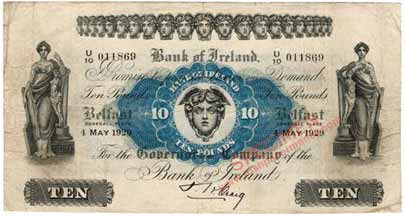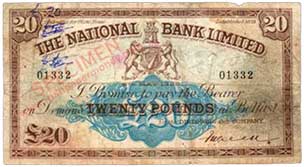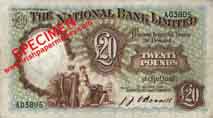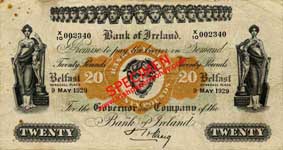

Ireland was ruled by the British until December 6th 1921. After this the country was partitioned into The Irish Free State (composed of 26 counties) and Northern Ireland (composed of 6 counties). Northern Ireland remained part of the United Kingdom, and the Irish Free State went on to become the Republic of Ireland.
During British rule several of the Joint Stock Commercial Banks had acquired the right to issue banknotes under various rules and restrictions. The Bank of Ireland was the first bank to issue paper money for circulation exclusively in Ireland. Its first issue was in 1783. Other banks later also received the right to issue paper money.
The right of note issue continued during the early years of the Irish Free State. The Currency Act 1927 provided for the creation of the Currency Commission Ireland to control the issue of currency in the new Irish state. In 1928 it commenced the issue of Series A Legal Tender Notes.


In 1929 the currency issues of the Associated Banks (commercial banks) in the island of Ireland split into Consolidated Banknotes controlled by the Currency Commission in the Irish Free State, and a new Belfast issue in Northern Ireland. The Consolidated Banknote Issue replaced the banks' own note issues in the Irish Free State.
All six of the Joint Stock banks that had the right of note issue under British rule in Ireland continued to issue their own notes in Northern Ireland as part of the Northern Ireland Belfast Issue from 1929. They were: Bank of Ireland, National Bank, Ulster Bank, Northern Bank, Provincial Bank of Ireland, Belfast Banking Company.
The notes issued by the six banks were never legal tender, except during World War Two when Legal Tender status was granted as an emergency measure. This status was revoked again after the end of the war.
There are two basic Type groups for Northern Ireland banknotes.
Older Design Northern Ireland Banknotes 1929–ca1967
These notes were generally larger and based on the pre-1929 designs
Modern Smaller Sized Banknotes ca1967–1999
All of the banks began to new produce modern small sized note designs in the late 1960s and early 1970 These banknotes incorporated the latest security features of the time.
Examples of many of the old banknote varieties and types are not available for illustration here. We would welcome submissions from anyone in possession of banknotes not pictured on this web site.






The first polymer note in Northern Ireland was issued by Northern Bank in 1999, in a special issue of two million notes.
Polymer banknotes, plastic notes, started to enter circulation again in Northern Ireland in 2019. Bank of Ireland, Danske Bank and Ulster Bank are replacing their paper note issues with polymer notes. The most recent polymer note to appear is the Ulster Bank £50 note, which entered circulation on 15 June 2022.
Denominations issued up to October 2022 are as follows: Danske Bank, £10, £20 notes; Ulster Bank, £5, £10, £20, £50 notes; Bank of Ireland, £5, £10, £20 notes. Paper notes of higher denominations remain valid.
Replacement notes of the new Polymer notes are added on the Polymer Notes forum thread as they are reported.
ZZ replacement notes have been seen for the new Danske Bank £10 note. They mark a new series as previously YY had been the prefix in use for replacements of this denomination.
ZZ replacements have been seen for Bank of Ireland £5 and £10 denominations. The replacement prefix continues from the previous series. The Bank of Ireland regards the new polymer note designs as being part of its previous Bushmills series. It is a new series from the collector's viewpoint.
Z singletter prefix replacement notes have been reported for Ulster Bank polymer notes, but this has not been confirmed by sight of an example.
First Trust Bank has ceased issuing banknotes. Part of AIB group, First Trust Bank announced in 2020 that it would end its note issue and gradually withdraw its notes from circulation. Its notes ceased to circulate at midnight on 30th June 2022. After this date old notes of the bank, and those of its previous issues (issued under Provincial Bank of Ireland, and Allied Irish Banks) can be exchanged without time limit in the bank's branches for current issue Bank of England notes.
Irish Joint Stock Banks of Note Issue from 1783
Contemporary Forgeries of Early Irish Banknotes ca1800-1930
Banknote Design Evolution 1824 to 1916
Irish Three Pound Notes of the Joint Stock Banks
The Transition of Irish Currency, Irish banknotes 1918–1928
The Partition of Irish currency, Irish banknotes 1928–1930
Low Number Irish Banknotes